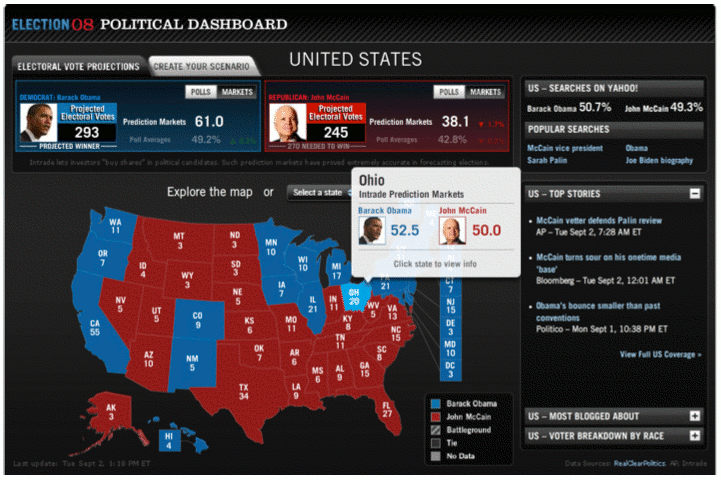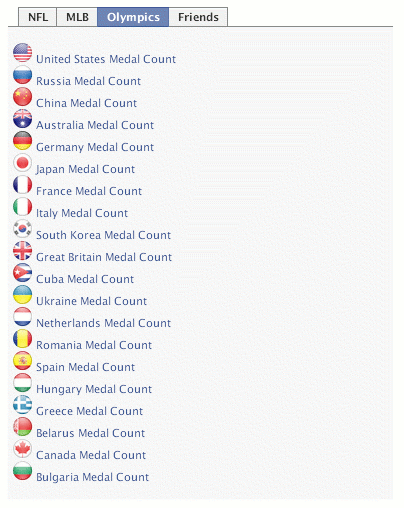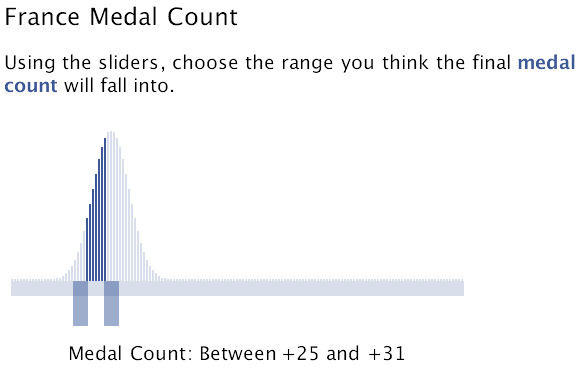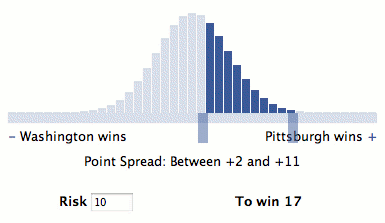I am happy to announce the following prediction market workshop and solicit submissions and participants.
=======================================================================
Call for Contributions and Participation
Third Workshop on Prediction Markets
http://betforgood.com/events/pm2008/index.html
Afternoon of July 9, 2008
Chicago, Illinois
In conjunction with the
ACM Conference on Electronic Commerce (EC’08)
SUBMISSIONS DUE May 23, 2008
=======================================================================
We solicit research contributions, system demonstrations, and
participants for the Third Workshop on Prediction Markets, to be held
in conjunction with the Ninth ACM Conference on Electronic Commerce
(EC’08). The workshop will bring together researchers and
practitioners from a variety of relevant fields, including economics,
finance, computer science, and statistics, in both academia and
industry, to discuss the state of the art today, and the challenges
and prospects for tomorrow in the field of prediction markets.
A prediction market is a financial market designed to elicit a
forecast. For example, suppose a policymaker seeks a forecast of the
likelihood of an avian flu outbreak in 2009. She may float a security
paying $1 if and only if an outbreak actually occurs in 2008, hoping
to attract traders willing to speculate on the outcome. With
sufficient liquidity, traders will converge to a consensus price
reflecting their collective information about the value of the
security, which in this case directly corresponds to the probability
of outbreak. Empirically, prediction markets often yield better
forecasts than other methods across a diverse array of settings.
The past decade has seen a healthy growth in the field, including a
sharp rise in publications and events, and the creation of the Journal
of Prediction Markets. Academic work includes mechanism design,
experimental (laboratory) studies, field studies, and empirical
analyses. In industry, several companies including Eli Lilly, Corning,
HP, Microsoft, and Google have piloted internal prediction
markets. Other companies, including ConsensusPoint, InklingMarkets,
InTrade, and NewsFutures, base their business on providing public
prediction markets, prediction market software solutions, or
consulting services. The growth of the field is reflected and fueled
by a wave of popular press articles and books on the topic, most
prominently Surowiecki’s “The Wisdom of Crowds”.
Workshop topics
===============
The area of prediction markets faces challenges regarding how best
to design, deploy, analyze, implement, and understand prediction
markets. One important research direction is designing mechanisms for
prediction markets, especially for events with a combinatorial outcome
space. Another notable issue is manipulation in prediction
markets. Understanding the effect of manipulation is especially
important for prediction markets to find their way to assist
individuals and organizations in making critical decisions. Moreover,
how to implement market mechanisms that not only are easy to use but
also facilitate information aggregation has been an important problem
for practitioners. Prediction markets face social and political
obstacles including antigambling laws and moral and ethical concerns,
both real and constructed.
Submissions of abstracts for research contributions from a rich set
of empirical, experimental, and theoretical perspectives are
invited. Topics of interest at the workshop include, but are not
limited to:
* Mechanism design
* Game-theoretic analysis of mechanisms, behaviors, and dynamics
* Decision markets
* Combinatorial prediction markets
* Market makers for prediction markets
* Manipulation and prediction markets
* Order matching algorithms
* Computational issues of prediction markets
* Liquidity and thin markets
* Laboratory experiments
* Empirical analysis
* Prediction market modeling
* Industry and field experience
* Simulations
* Policy applications and implications
* Internal corporate applications
* Legal and ethical issues
Submissions of summaries for demonstrations on prediction market
systems are invited. Systems of interest at the workshop include, but
are not limited to:
* Implemented combinatorial prediction markets
* Mature systems and commercial products of market mechanisms
* Research prototypes on prediction markets
* Other collective prediction systems
Submission instructions
=======================
Research contributions should report new (unpublished) research
results or ongoing research. We request an abstract not exceeding one
page for every research contribution.
For system demonstrations, a summary of up to two pages including
technical content to be demonstrated is requested. Please indicate if
the demonstration requires network access.
Research contributions and system demonstrations should be submitted
electronically to the organizing committee at pm2008@umich.edu no
later than midnight Hawaii time May 23, 2008.
At least one author of each accepted research contribution and
system demonstration will be expected to attend and present or
demonstrate their work at the workshop.
Important dates
===============
May 23, 2008: Submissions due midnight Hawaii Time
May 30, 2008: Notification of accepted research contributions and
system demonstrations
July 9, 2008: Workshop date
Organizing committee
====================
Yiling Chen, Yahoo! Inc
David Pennock, Yahoo! Inc
Rahul Sami, University of Michigan
Adam Siegel, Inkling Markets
More information
================
For more information or questions, visit the workshop website:
http://betforgood.com/events/pm2008/index.html
or email the organizing committee: pm2008@umich.edu
 Here’s a brilliant idea: Centrist Messenger let’s you buy political ads with a money-back guarantee. You pay only if your preferred candidate wins. If the other candidate wins, you get your money back.
Here’s a brilliant idea: Centrist Messenger let’s you buy political ads with a money-back guarantee. You pay only if your preferred candidate wins. If the other candidate wins, you get your money back.


